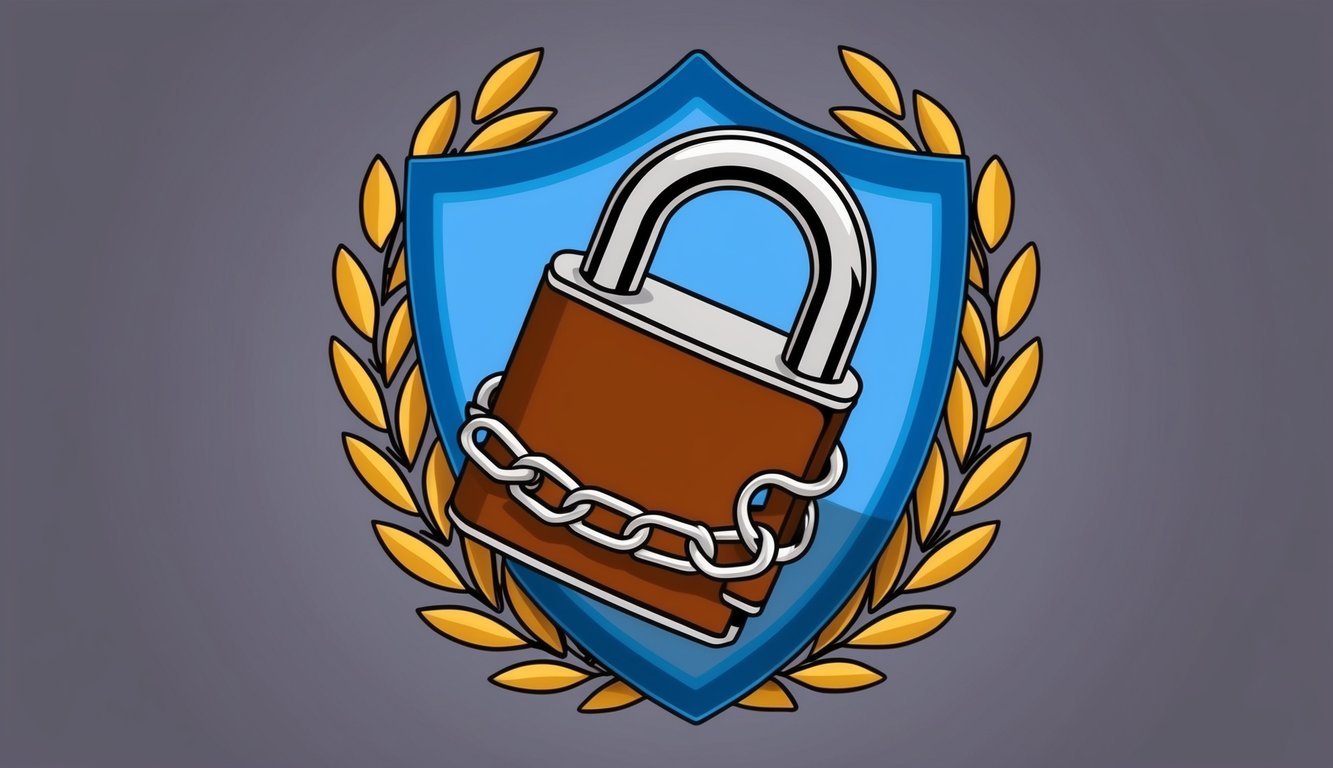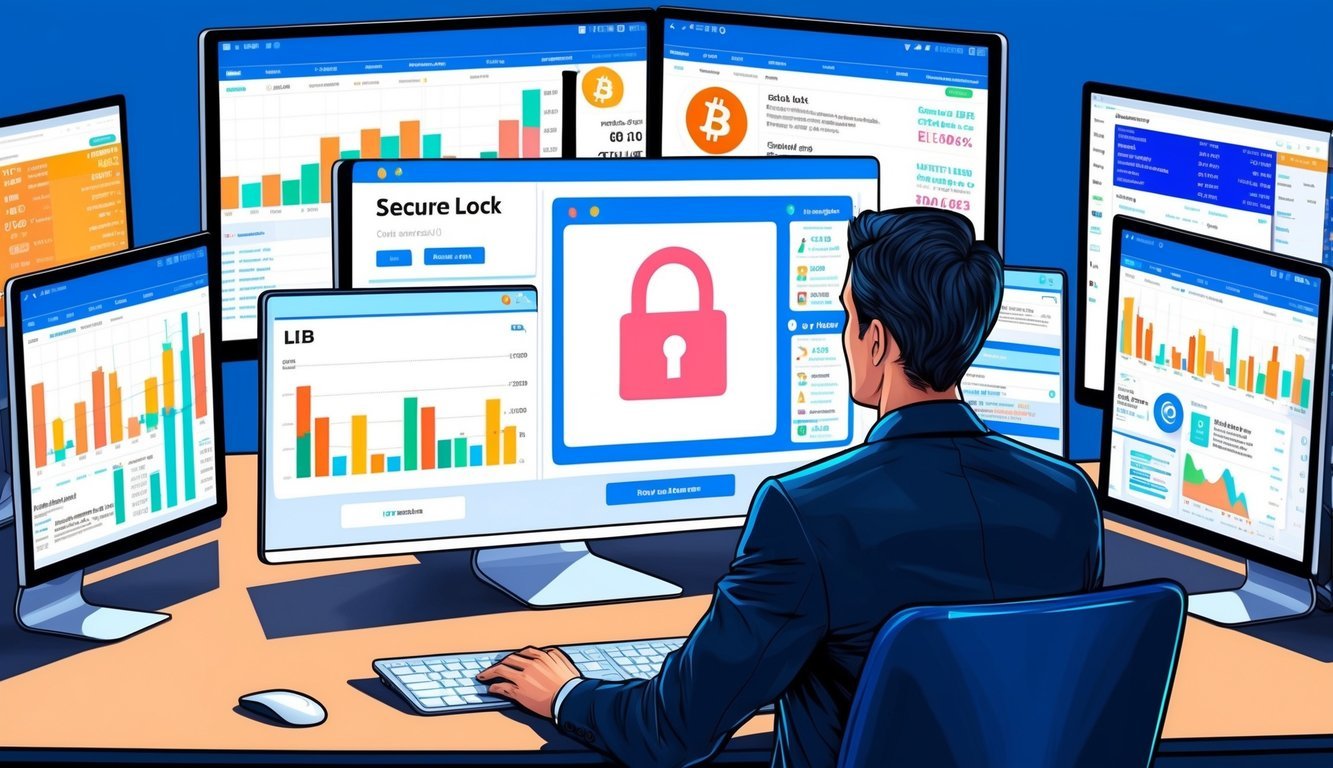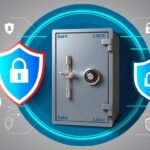Crypto is big money these days. With all the cash flowing in digital currencies, hackers and scammers are eyeing your accounts. Keeping your crypto safe is super important.

Strong passwords and two-factor authentication are key to protecting your digital assets.
But that’s just the start. You need to be smart about how you handle your crypto info online and offline too.Securing your crypto account isn’t rocket science, but it does take some know-how. We’ll walk you through the basics and some pro tips to keep your digital coins safe and sound.
Key Takeaways
- Use strong passwords and turn on two-factor authentication for your accounts
- Be careful about where you access your crypto and don’t share your private keys
- Stay up-to-date on the latest security threats and best practices
Understanding Crypto Security Fundamentals
Crypto security is all about keeping your digital money safe. It’s built on some key ideas that help protect your funds from bad guys.
Deciphering Blockchain and Cryptography
Blockchain technology is the backbone of crypto security. It’s like a big digital ledger that everyone can see but no one can change easily. This makes it hard for thieves to mess with your money.
Cryptography is the secret sauce that keeps your info safe. It uses complex math to scramble your data. This means only you can access your crypto with the right key.
Crypto wallets use these ideas to keep your funds secure. They store your keys and let you send and receive crypto safely.
Private vs Public Keys
Your crypto account has two important keys: private and public. Think of them like a mailbox – anyone can see your address, but only you have the key to open it.
Your public key is like your crypto address. You can share it with others so they can send you money. It’s safe to give out.
Your private key is super secret. It lets you access and move your crypto. Never share it with anyone! If someone gets your private key, they can steal your funds.
To keep your private key safe, write it down on paper, use a secure password manager, or don’t store it on your computer or phone.
Protecting Your Crypto Assets
Keeping your crypto safe is super important. You need to be smart about passwords, use extra security steps, pick the right wallet, and watch out for sneaky scams.
Creating and Managing Strong Passwords
Strong passwords are key to keeping your crypto safe. Mix up letters, numbers, and symbols to make them tough to crack. Don’t use the same password for different accounts.
A good trick is to use a password manager. It helps you make and remember complex passwords. This way, you only need to remember one master password.
Change your passwords often, like every few months. If a site you use gets hacked, change that password right away.
Never share your passwords with anyone. Not even your best friend or your dog!
The Role of Multi-Factor Authentication
Multi-factor authentication (MFA) is like a super shield for your accounts. It asks for more than just your password to log in.
Two-factor authentication (2FA) is the most common type. It might send a code to your phone or use an app to generate one.
Always turn on 2FA for your crypto accounts. It makes it way harder for bad guys to get in, even if they guess your password.
Some sites offer even stronger options, like fingerprint or face scans. Use these if you can. They’re super secure.
Safe Storage Options: Hot vs Cold Wallets
You’ve got two main choices for storing your crypto: hot wallets and cold wallets.
Hot wallets are connected to the internet. They’re easy to use but less secure. Good for small amounts you use often.
Cold wallets, or hardware wallets, are offline. They’re super secure but a bit harder to use. Great for large amounts you want to keep safe.
Popular cold wallets look like USB sticks. They keep your crypto offline and safe from hackers.
For everyday use, consider a mix. Keep a little in a hot wallet and the rest in cold storage.
Guarding Against Phishing and Scams
Scammers are always trying to trick you. They might pretend to be your crypto exchange in an email or text.
Never click links in emails about your crypto. Go directly to the website instead.
Watch out for fake websites. They might look real but have a slightly different web address.
Be careful of offers that seem too good to be true. If someone promises huge returns, it’s probably a scam.
Don’t trust random people online who want to “help” with your crypto. Real companies won’t ask for your private keys.
Stay alert and trust your gut. If something feels off, it probably is. Better safe than sorry!
Implementing Advanced Security Measures
Upping your crypto security game takes a bit more effort, but it’s worth it. These steps can make a big difference in keeping your digital assets safe.
Using VPNs and Antivirus for Added Security
A Virtual Private Network (VPN) is a must-have when dealing with crypto. It hides your real IP address and encrypts your internet traffic. This makes it harder for hackers to track your online activities.
Don’t forget about antivirus software. It’s your first line of defense against malware that could steal your crypto keys. Keep it updated and run regular scans.
Here are some quick tips:
- Use a reputable VPN service
- Turn on your VPN before accessing crypto sites
- Install antivirus on all your devices
- Update your antivirus software regularly
Understanding Custody and Recovery Processes
Self-custody means you’re in charge of your crypto keys. It’s great for control, but comes with responsibility. You need to keep your seed phrase safe. This is a list of words that can restore your wallet if you lose access.
Write down your seed phrase on paper. Don’t store it digitally. Keep it in a safe place, like a fireproof box. Some people even split it up and store parts in different locations.
Backup tips:
- Write your seed phrase by hand
- Store it in multiple secure locations
- Never share it with anyone
- Consider using a metal backup for fire safety
Staying Updated and Informed

Keeping up with the latest crypto news and security trends is key to protecting your assets. You’ll need to stay on top of market changes and learn from past security issues.
Keeping Track of the Crypto Market
The crypto market moves fast. You should check trusted news sites daily for updates. Look for info on price changes, new coins, and exchange updates. Follow crypto experts on social media for quick tips.
Set up alerts for big market shifts. This helps you spot unusual activity in your accounts. Keep an eye on trading volume and market caps. These can hint at upcoming trends.
Learn about new security features your exchange adds. Enable them right away to boost your protection. Stay informed about any data breaches or hacks affecting exchanges you use.
Learning from Security Breaches and Crypto Hacks
Crypto hacks happen often. Each one teaches valuable lessons. Read about past security breaches to understand common tricks hackers use.
Look for patterns in how attackers get in. Many use phishing or malware attacks. Learn to spot these threats to protect yourself.
Pay attention to how exchanges respond to hacks. Good ones improve security and help users. Bad ones might try to hide problems. Use this info to pick safer places for your crypto.
Watch for new types of scams. Criminals always create new tricks. Staying alert helps you avoid falling for them. Remember, if a deal looks too good, it probably is.
Frequently Asked Questions

Crypto security involves using strong passwords, two-factor authentication, and secure storage methods. Being careful with public Wi-Fi and watching out for scams are also key.
How can I beef up the security on my crypto wallet?
Use a strong password with letters, numbers, and symbols. Don’t use easy-to-guess info like birthdays.
Turn on two-factor authentication (2FA) for an extra layer of protection. This makes it harder for bad guys to break in.
What steps should I take to protect my crypto from digital thieves?
Be careful on public Wi-Fi. It’s risky to check your crypto accounts there.
Watch out for phishing. Scammers might pretend to be crypto companies to trick you. Always double-check email addresses and links.
What are the top cryptocurrency security measures recommended by experts?
Use a hardware wallet for long-term storage. It keeps your crypto offline and safe.
Keep your software up to date. This includes your wallet apps and phone operating system.
What’s the most secure way to store my crypto stash?
A hardware wallet is super secure. It’s like a special USB stick for your crypto.
For smaller amounts, a mobile wallet with good security features can work. Just make sure to back it up.
How can I make my Crypto.com account super safe?
Use a unique, strong password. Don’t reuse it from other sites.
Turn on 2FA using an authenticator app. This is safer than SMS-based 2FA.
Are there any cool tips for ensuring my crypto transactions are safe and sound?
Double-check addresses before sending crypto. One wrong character can lose your funds.
Use block explorers like Etherscan to verify transactions. They show you what’s happening on the blockchain.





